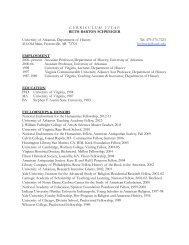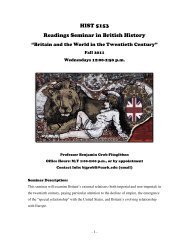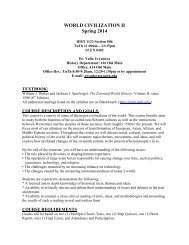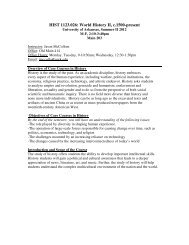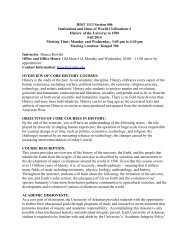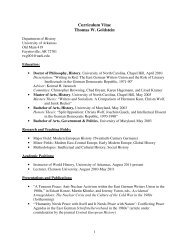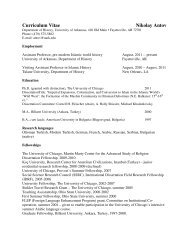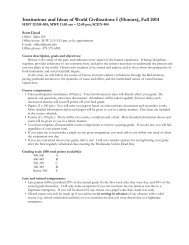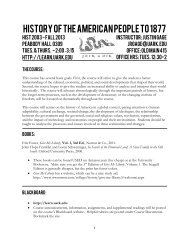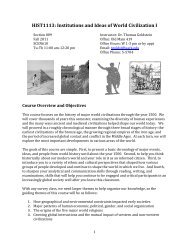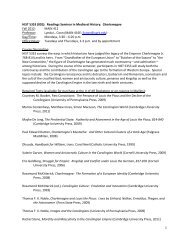HIST1123: Institutions and Ideas of World Civilization II - History
HIST1123: Institutions and Ideas of World Civilization II - History
HIST1123: Institutions and Ideas of World Civilization II - History
You also want an ePaper? Increase the reach of your titles
YUMPU automatically turns print PDFs into web optimized ePapers that Google loves.
<strong>HIST1123</strong>: <strong>Institutions</strong> <strong>and</strong> <strong>Ideas</strong> <strong>of</strong> <strong>World</strong> <strong>Civilization</strong> <strong>II</strong><br />
Section 010<br />
Instructor: Dr. Thomas Goldstein<br />
Spring 2012 Office: Old Main 419<br />
KIMP0210<br />
Office Hours: W 1 pm – 3 pm or by appt<br />
Tu-Th 9:30-10:50 am<br />
Email: tgoldst@uark.edu<br />
Office Phone: 5-5704<br />
Course Overview <strong>and</strong> Objectives:<br />
This course focuses on the history <strong>of</strong> major world civilizations from the year 1500 to the<br />
present. Covering over five hundred years, we will examine the diversity <strong>of</strong> human<br />
experiences <strong>and</strong> the ways in which the past has shaped the world we now inhabit. We will<br />
proceed in a roughly chronological manner through five stages <strong>of</strong> history: the rise <strong>of</strong> the<br />
Atlantic world <strong>and</strong> global economy, 1500-1750; the age <strong>of</strong> revolutions, 1750-1850;<br />
imperialism <strong>and</strong> world wars, 1850-1950; decolonization <strong>and</strong> nation-building, 1950-1991;<br />
<strong>and</strong> (briefly) the contemporary world, 1991-present. At each turn, we will explore the<br />
most important developments in various areas <strong>of</strong> the world.<br />
The goals <strong>of</strong> this course are simple. First, to present a basic chronology <strong>of</strong> major events,<br />
ideas, <strong>and</strong> people from world history from about 1500 to the present. Second, to help you<br />
think historically about our modern world <strong>and</strong> your role in it as an informed citizen. Third,<br />
to introduce you to a variety <strong>of</strong> ethnic <strong>and</strong> cultural perspectives that shaped how various<br />
groups <strong>of</strong> people developed <strong>and</strong> continue to shape the world in which we live. And fourth,<br />
to sharpen your analytical <strong>and</strong> communication skills through reading, writing, <strong>and</strong><br />
examinations, skills that will help you continue to be engaged <strong>and</strong> critical participants in an<br />
increasingly global society well after you leave this classroom.<br />
With any survey class, we need larger themes to help organize our knowledge, so the<br />
guiding themes <strong>of</strong> this course will be as follows:<br />
1. The challenges <strong>and</strong> opportunities caused by the increasing interconnectivity <strong>of</strong> the<br />
modern world in terms <strong>of</strong> economic, social, political, <strong>and</strong> cultural connections<br />
2. The impact <strong>of</strong> western <strong>and</strong> non-western ideas <strong>and</strong> ideals on societies around the<br />
world<br />
3. Competing models <strong>of</strong> state-building<br />
4. How various people have sought to define their identity in a rapidly changing world<br />
1
Readings<br />
The following books are required for this course. They are available for purchase at the<br />
Arkansas campus bookstore. You may find these books cheaper online at any <strong>of</strong> a number<br />
<strong>of</strong> sites (e.g., half.com, abebooks.com, amazon.com), but it will likely take a week or more<br />
for the books to arrive (so order them soon).<br />
• Jiu-Hwa L. Upshur et al., <strong>World</strong> <strong>History</strong>, Since 1500: Volume <strong>II</strong>, 5 th edition (Cengage)<br />
• Jamaica Kincaid, A Small Place (Farrar, Straus, <strong>and</strong> Giroux)<br />
• Marjane Satrapi, The Complete Persepolis (R<strong>and</strong>om House)<br />
There will be additional smaller readings available via our class blackboard website.<br />
NOTE: You are to complete the assigned reading by the beginning <strong>of</strong> class on the day on<br />
which it is listed in the schedule <strong>of</strong> classes below.<br />
Requirements <strong>and</strong> Grading<br />
Lectures:<br />
Much <strong>of</strong> the information you will receive will come from lectures. Information from<br />
lectures will be used in constructing the midterm <strong>and</strong> final <strong>and</strong> will also help “set the scene”<br />
for your readings <strong>and</strong> provide context to help you write your papers.<br />
Attendance:<br />
Attendance is required for this course. You may miss up to four (4) classes for any reason<br />
without consequences, but beyond that, you will lose 0.5% <strong>of</strong>f your final course grade for<br />
each additional absence. For instance, if you miss eight classes (four more than permitted),<br />
you will earn a 2% deduction in your final grade. Also note that arriving late to class three<br />
times will be considered as one unexcused absence. If you have perfect attendance for the<br />
semester, you will receive a 1% bonus for your overall course grade.<br />
If you need to miss a class for a legitimate reason (medical or otherwise), you must<br />
provide documentation as far in advance as possible. This means that if you miss class<br />
because you are feeling a little under the weather but do not have a doctor’s note, the<br />
absence will not be excused. In other words, you must document every absence if you<br />
want it to be excused.<br />
Reading quizzes:<br />
At the beginning <strong>of</strong> class on days labeled “discussion” below, we will have a brief reading<br />
quiz. These quizzes are designed to test whether you have read the assigned material. If<br />
you have read the material carefully, taken notes, <strong>and</strong> thought critically about it, you should<br />
do fine. If you have rushed through the readings without taking notes or critical reflection,<br />
you will do poorly. At the end <strong>of</strong> the semester, I will drop your lowest quiz score. There<br />
will be no make-ups for quizzes, so if you miss a quiz, it will count as your dropped score.<br />
2
Paper:<br />
In late March, you must compose a 4-5-page essay comparing the assigned readings.<br />
Specific questions to be answered will be provided in advance <strong>of</strong> the paper’s due date.<br />
Exams:<br />
There will be two exams in this course, each consisting <strong>of</strong> a mixture <strong>of</strong> term identifications,<br />
objective components, <strong>and</strong> essay questions. The questions will all be drawn from lecture<br />
<strong>and</strong> the course readings <strong>and</strong> will cover both larger themes <strong>and</strong> more specific details. A<br />
terms list will be distributed one week prior to the exams to aid your studying.<br />
Grading:<br />
Quizzes<br />
15% (average <strong>of</strong> your highest five quiz scores)<br />
Paper 25%<br />
Midterm 25%<br />
Final exam 35%<br />
Rules <strong>and</strong> Policies<br />
Blackboard Website:<br />
The primary means <strong>of</strong> communication <strong>and</strong> the distribution <strong>of</strong> information for this class will<br />
be through our course blackboard website. To this end, you should check our site regularly<br />
for updates, assignments, paper guides, <strong>and</strong> grades. I will also post course powerpoints<br />
here. If you are having difficulties accessing our class blackboard site, let me know ASAP.<br />
Laptops:<br />
Laptops will be permitted in this class but if they become a distraction for you or your<br />
fellow students, you will not be permitted to use them. In other words, don’t let me catch<br />
you playing Angry Birds on your iPad lest you want me to confiscate it so I can play Angry<br />
Birds (but only AFTER lecture).<br />
Classroom Behavior:<br />
You are expected to be in class on time, pay attention in lecture, turn <strong>of</strong>f your cell phone,<br />
<strong>and</strong> refrain from disruptive behavior (talking, surfing the internet, texting, eating loudly,<br />
passing notes, sleeping, reading the newspaper, practicing semaphore, etc.). Failure to do<br />
so could lead to you being asked to leave the classroom, which would mean an unexcused<br />
absence counted against your grade.<br />
Late assignments:<br />
Assignments are due at the beginning <strong>of</strong> class on the day listed below in the course<br />
schedule. I will accept late assignments, but out <strong>of</strong> fairness to the other students who<br />
meet the deadlines, your paper will be graded down by half a letter grade (for example<br />
from 85 to 80) for every twenty-four-hour period for which it is late. Computer failure,<br />
printer jams, or limited computer access are not legitimate excuses for late assignments.<br />
3
Communication:<br />
E-mail is an efficient, reliable, <strong>and</strong> useful form <strong>of</strong> communication, but it is also a highly<br />
impersonal way <strong>of</strong> getting in touch with someone. For pr<strong>of</strong>essional correspondences, it is<br />
important that you personalize an e-mail message as much as you can in order for it to<br />
come across as polite, courteous, <strong>and</strong> pr<strong>of</strong>essional. One <strong>of</strong> the best ways is to make sure<br />
that you address an e-mail like you would a normal letter; use “Dear Dr. Goldstein,” or “Hi<br />
Dr. Goldstein,” before you begin the rest <strong>of</strong> your e-mail. End it by saying “Thanks, The<br />
Situation” or “Best regards, Snooki.” These little touches, so easy to do but so <strong>of</strong>ten<br />
forgotten in the rush to press “send,” go a long way to making your e-mails much more<br />
pleasant, personal, <strong>and</strong> courteous.<br />
More generally, communication with the instructor is expected in any situation that may<br />
affect your ability to fulfill course requirements. All such communication is the<br />
responsibility <strong>of</strong> the student.<br />
Plagiarism:<br />
Plagiarism is the intentional or unintentional use <strong>of</strong> someone else’s words or ideas without<br />
explicitly citing it as such. It is strictly prohibited at Arkansas <strong>and</strong> is something I take very<br />
seriously. Besides, it usually takes more effort to plagiarize than to do the assignment<br />
honestly, so it’s not worth risking your academic career for an assignment worth only a<br />
small percentage <strong>of</strong> your grade. If you are caught plagiarizing on any <strong>of</strong> your assignments, I<br />
am required to report it, so don’t do it.<br />
Seriously – don’t.<br />
If you are unsure what constitutes plagiarism, ask me or see Arkansas’s guide to paper<br />
citation: http://libinfo.uark.edu/reference/citingyoursources.asp.<br />
Schedule <strong>of</strong> Classes<br />
* Reading available via the course blackboard site<br />
Part I: The Rise <strong>of</strong> the Global Economy <strong>and</strong> Atlantic <strong>World</strong>, 1500-1750<br />
Week 1<br />
1/17 The Conquest <strong>of</strong> the Americas <strong>and</strong> the Dawn <strong>of</strong> the Global Age<br />
1/19 The Protestant Reformation <strong>and</strong> Religious Warfare in Europe<br />
Read: Martin Luther documents*; Upshur et al., <strong>World</strong> <strong>History</strong>, 474-491<br />
Week 2<br />
1/24 The American Empires <strong>and</strong> the Transatlantic Slave Trade<br />
Read: Bartolomé de las Casas, “The Devastation <strong>of</strong> the Indies”*; Upshur, 491-508<br />
1/26 Discussion: The Experience <strong>of</strong> Slavery<br />
Read: Slave trade documents*<br />
Quiz #1<br />
4
Week 3<br />
1/31 The Scientific Revolution <strong>and</strong> the Enlightenment<br />
Read: “Salon Life”*; Upshur, 580-605<br />
2/2 The Muslim Empires, 1500-1800<br />
Read: Upshur, 451-463, 513-537<br />
Week 4<br />
2/7 Early Modern China <strong>and</strong> Japan<br />
Read: Upshur, 537-575<br />
2/9 Discussion: Early Modern Global Connections<br />
Read: Early modern documents*<br />
Quiz #2<br />
Part <strong>II</strong>: The Age <strong>of</strong> Revolutions, 1750-1850<br />
Week 5<br />
2/14 The Enlightened Despots <strong>of</strong> Eastern Europe<br />
Read: Frederick the Great, “Essay on the Forms <strong>of</strong> Government”*; Upshur, 605-611<br />
2/16 The American Revolutions<br />
Read: Upshur, 611-629, 669-672<br />
Week 6<br />
2/21 The French Revolution <strong>and</strong> Napoleonic Europe<br />
Read: 647-665<br />
2/23 Discussion: The Enlightenment Revolutions<br />
Read: Read: Enlightenment revolutions documents*<br />
Quiz #3<br />
Week 7<br />
2/28 The Industrial Revolution<br />
Read: “Leeds Woolen Workers Petition,“ “Letter from Leeds Cloth Merchants”*;<br />
Upshur, 629-641<br />
3/1 Industrial Society <strong>and</strong> the Birth <strong>of</strong> Modern Ideologies<br />
Read: Upshur, 665-669, 672-715<br />
Week 8<br />
3/6 Midterm exam<br />
Part <strong>II</strong>I: Imperialism <strong>and</strong> <strong>World</strong> Wars, 1850-1950<br />
3/8 European Imperialism in Asia <strong>and</strong> Africa<br />
Read: Upshur, 719-750<br />
Week 9<br />
3/13 The First <strong>World</strong> War<br />
Read: Upshur, 750-767<br />
5
3/15 Discussion: Perspectives on Imperialism<br />
Read: Imperialism documents*<br />
Quiz #4<br />
Week 10<br />
3/20 No class: Spring Break<br />
3/22 No class: Spring Break<br />
Week 11<br />
3/27 The Russian Revolution <strong>and</strong> Stalinism<br />
Read: Upshur, 815-826<br />
3/29 The Great Depression <strong>and</strong> the Rise <strong>of</strong> Hitler<br />
Read: Upshur, 767-782, 856-866<br />
Course paper due<br />
Week 12<br />
4/3 The Second <strong>World</strong> War<br />
Read: Atomic bomb documents*; Upshur, 866-893<br />
4/5 The Holocaust<br />
Week 13<br />
4/10 Discussion: Surviving the Holocaust<br />
Read: Holocaust documents*<br />
Quiz #5<br />
Part IV: Decolonization <strong>and</strong> Nation-Building, 1950-1991<br />
4/12 The Cold War<br />
Read: “The Truman Doctrine” <strong>and</strong> speech by Andrei Zhdanov *; Upshur, 930-950<br />
Week 14<br />
4/17 Decolonization in Africa <strong>and</strong> Asia<br />
Read: Upshur, 788-815, 911-923<br />
4/19 Discussion: Tourism as Neo-Imperialism<br />
Read: Jamaica Kincaid, A Small Place<br />
Quiz #6<br />
Week 15<br />
4/24 The Slow Decline <strong>and</strong> Rapid Fall <strong>of</strong> the Communist Bloc<br />
Read: excerpt from Vaclav Havel, The Power <strong>of</strong> the Powerless*; Upshur, 950-971<br />
4/26 Arab Upheaval: Nationalism, Fundamentalism, <strong>and</strong> Revolutions<br />
Read: “Iran’s New Revolutionaries”*; Upshur, 923-930, 980-986<br />
Week 16<br />
5/1 Discussion: The Iranian Revolution<br />
Read: Marjane Satrapi, The Complete Persepolis<br />
6
Part V: The Contemporary <strong>World</strong><br />
5/3 Globalization <strong>and</strong> Its Discontents<br />
Read: Upshur, 971-980, 986-1012<br />
Final Exam: Thursday 5/10 8:00-10:00 am<br />
7



